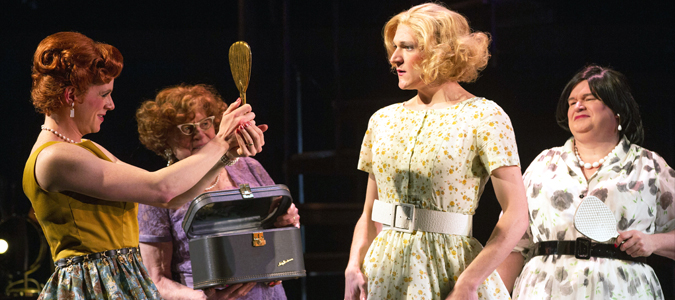

Casa Valentina
Opening Night: April 23, 2014
Closing: June 29, 2014
Theater: Samuel J. Friedman
Based on actual events, Casa Valentina is set in the 1960s and tells the tale of men who went to the Catskill Mountains to escape the summer heat, and something else entirely: being men. Nestled in the land of dirty dancing and borscht belt comedy sat an inconspicuous bungalow colony that catered to a very special clientele: heterosexual men whose favorite pastime was dressing and acting as women. It was paradise for these men—white-collar professionals with families—to spend their weekends discreetly and safely inhabiting their chosen female alter egos. But when faced with the opportunity to become an official organization, these “self-made women” had to decide whether public recognition would help them gain a place in open society or spell their own personal disaster.
BUY TICKETSREAD THE REVIEWS:
April 23, 2014
The 1982 work that put playwright-actor Harvey Fierstein on the map was Torch Song Trilogy, a bittersweet account of a New York Jewish drag queen’s longing for love and family. In Casa Valentina, his first full-length non-musical play on Broadway in almost 30 years, he explores a curious footnote in transgender history, setting the action in 1962 at a Catskill Mountains cross-dressing resort where married men went to lose themselves in female identities for the weekend. Joe Mantello’s impeccable production and a cast of outstanding actors make this an engrossing portrait of a marginalized group, but the strong set-up isn’t matched by focused follow-through.
READ THE REVIEWApril 23, 2014
In the early 1960s, a secluded bungalow camp in the Catskills was paradise to a few men. It was where they could be themselves — that is, women. That real-life haven, where the most masculine guy could chillax in a bouffant and puffy skirt, provided the inspiration for Casa Valentina, Harvey Fierstein’s new dramedy. Fierstein is Broadway’s reigning expert on gender-bending, having written Torch Song Trilogy, La Cage aux Folles and Kinky Boots. But here he explores a very different side of it.
READ THE REVIEWApril 23, 2014
Harvey Fierstein’s new play, Casa Valentina, isn’t about drag queens, although you’d certainly be excused for thinking it is. Grown men swan around in dresses and pearls, lip-syncing to old records and swapping makeup tips. Size-13 heels clatter across the stage. But the men who stayed at the Chevalier D’Eon, the real-life 1960s Catskills retreat at the heart of The Manhattan Theatre Club’s fascinating and intricately drawn period piece, weren’t drag performers at all. They were transvestites seeking a safe haven from a disapproving world, businessmen and upright citizens who felt an irresistible urge to wear women’s clothing—and whose greatest goal was to ”pass” for female with understated wigs and hausfrau dresses. They were also almost exclusively straight and married.
READ THE REVIEWJune 23, 2014
Harvey Fierstein’s first nonmusical play since 1987’s Safe Sex concerns a group of straight men who in 1962 meet in the Catskills to dress and act like women. The ensemble includes such fine character actors as Larry Pine, Reed Birney, Gabriel Ebert and Patrick Page. Clothes unmake the men in Casa Valentina, Harvey Fierstein’s mostly effective period drama about cross-dressers in 1962. Set at a Catskills resort that caters to straight married fellows who secretly dress and act like women, the play delicately traverses a midcentury American subculture at the time represented only in dirty jokes and horror movies. But if you want to know what impels these men to externalize their feminine sides, the play has difficulty peeling away more than a layer or two—it’s more about gussying up than stripping bare.
READ THE REVIEWApril 23, 2014
A beguilingly gentle magic whispers amid the speechifying of Casa Valentina, Harvey Fierstein’s prolix play about cross-dressing in the Catskills in the early 1960s. This intermittent, quiet enchantment is generated by men who otherwise tend to obstreperousness. But put any one of them in front of a mirror, with a tube of lipstick and some eyeliner, and he falls into a wordless rapture, as silent and luminous as a newly lighted candle. Directed with unexpected ripples of beauty by Joe Mantello, Casa Valentina, which opened on Wednesday night at the Samuel J. Friedman Theater, conveys the blessed consummation that occurs for ordinary people when they’re transformed externally into what they think they are inside. As a Tony-winning chronicler of the lives of drag performers, in Torch Song Trilogy and the musicals La Cage Aux Folles and Kinky Boots, Mr. Fierstein has dealt with similar material before. But the central characters in those earlier works were gay. The men who populate “Casa Valentina” — expertly embodied by a cast led by Patrick Page and Reed Birney — are emphatically heterosexual. Or so they say, and mostly you have no reason to doubt them. Yet while they never quite eradicate their masculine miens and mannerisms, they never feel more truly themselves than when they’re wearing women’s clothes.
READ THE REVIEW





















